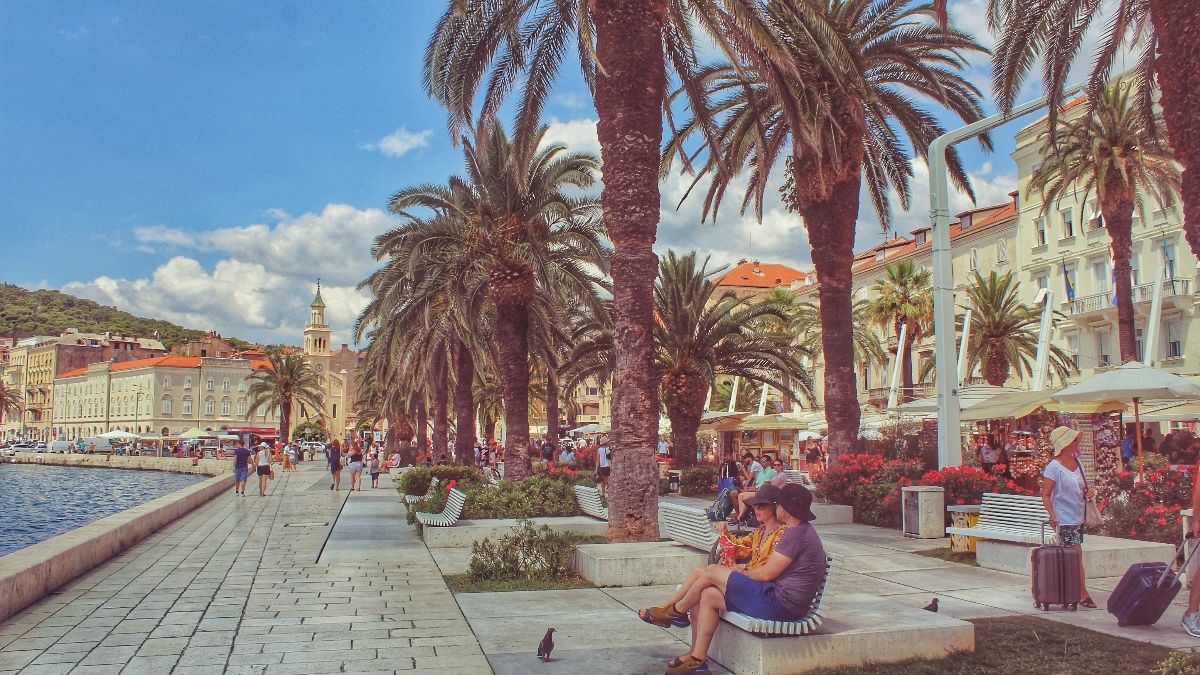Travel
Could Croatia be the most sustainable travel destination in Europe?

Shoulder season travel and regional destinations top the Balkan country’s sustainable tourism strategy.
Nikolina Brnjac was elected as Croatia’s Minister for Tourism in the midst of the COVID pandemic, when international travel was hit harder than ever before.
Despite the challenge she had ahead of her, she has put a focus on not only rebuilding the Balkan country’s battered tourism industry but on making Croatia a touchstone for sustainable travel.
Ahead of the summer season, she spoke to Euronews Travel about her plans for the future of tourism in Croatia.
A new law is helping put regional Croatian destinations on tourists’ radars
“During COVID, tourism was one of the most affected industries globally, but these crises also highlighted the need for a profound change in tourism development and management,” Brnjac says.
“Strengthening the resilience of tourism by setting up instruments to ensure its adaptability to different challenges is part of a bigger picture of building sustainable tourism.”
Her team’s vision now? They hope to develop tourism that is environmentally and socially sustainable.
Croatia has adopted its first ever Tourism Law which came into force this year.
In a country where tourism is unevenly regionally developed, it aims to decentralise the industry and adapt it to local and regional needs.
“Before, tourism was developed solely based on economic interests,” Brnjac explains. “We wanted to find a way to strengthen the resilience, implement sustainable practices and move away from the perception of success based solely on the number of overnight stays and revenue from tourism – that is, we wanted to find the right balance between the economic, environmental and social pillars of sustainability.”
She hopes the Tourism Law will help local communities to develop destinations, with the help of the national government. They’ll be given tools to both improve the quality of life of the local population and to mitigate the negative impact of tourism on the environment.
That’s something the law has written in stone, too, offering a framework for investment incentives in tourism, based on sustainability criteria.
Croatia will welcome Europe’s first Centre for Sustainable Tourism
Croatia became a member of the European Union in 2013 and of the Schengen Area in January 2023.
Brnjac has worked hard in conjunction with the EU to reach her goals for sustainable tourism, securing grants both privately and from the bloc’s Recovery and Resilience Programme and EU Multiannual Financial Framework, as well as through the Croatian state budget.
“We also secured grants for green and digital transition of private tourism infrastructure amounting to over €180 million,” she tells Euronews Travel.
“I am confident that this investment cycle will strongly contribute to sustainability, to the green and digital transition of our tourism, which is essential for future competitiveness and success.”
Croatia has been recognised as a leader in the development of sustainable tourism, not least by the Organisation for Economic Co-operation and Development (OECD) and the European Commission.
The United Nations has taken notice too and the World Tourism Organisation recently announced its initiative for establishing a Centre for Sustainable Tourism in Croatia – the first in Europe.
In collaboration with the University of Zagreb, experts will research, develop and promote sustainable tourism policies.
The teams at the centre will be able to share knowledge and best practices for sustainable tourism, including Croatia’s statistical framework and its application to wider policy development.
Why did Nikolina Brnjac lead with the decision to focus on sustainability in tourism?
“According to recent surveys, the tourists have changed their travel habits, and interest in sustainable destinations is growing,” Brnjac explains. “Travellers are increasingly aware of climate change and this is also shaping their perspectives on holiday travel.”
“They recognise the potential impacts, such as extreme temperatures, altered seasons, and more unpredictable weather conditions,” she adds. “I am sure that, in the future, our work on sustainability will have a positive impact on their overall experience of Croatia.”
She’s hopeful that it won’t be just tourists who will be impressed with the country’s efforts on sustainability, but other nations, too.
According to Brnjac, that’s already happening.
“On a policy level, we have had many bilateral and multilateral contacts with colleagues dealing with tourism, who experience similar challenges and are interested in learning from Croatia’s example,” she says.
Croatia is more expensive since adopting the euro – but it’s a win for sustainability
Following the Balkan nation’s accession into the Schengen zone and its adoption of the euro as currency in 2023, some say Croatia has become too expensive for many visitors.
Brnjac, though, says her efforts towards sustainability are bolstered by the higher prices which offer a better all round experience for tourists.
Higher costs are helping boost sustainability in other ways too, including by encouraging travellers to visit Croatia outside of its peak summer season.
“Croatia had the best shoulder-season results ever last year, and when we talk about the entire year, tourist results were on par with the record-breaking pre-pandemic years, and financially, it was the best in history,” says Brnjac.
In fact, in 2023, there were 20.6 million travellers who made 108 million overnight stays in Croatia, which was nine per cent up on the previous year.
For Brnjac, any criticism doesn’t seem to be distracting her from her focus on sustainability.
“It is not just a buzzword for us,” she says. “It is the basis for the enhanced quality of our products and services.”
“Tourism is primarily an industry that provides experiences, and sustainable tourism development equals a quality experience for our guests – with preserved natural and cultural resources, tradition, hospitality and security, along with tourist attractions and infrastructure adapted to the needs of our tourists.”
Higher prices, then, may continue but Brnjac is determined to stay on her current path: “Sustainable tourism development guarantees value for money spent,” she says.










